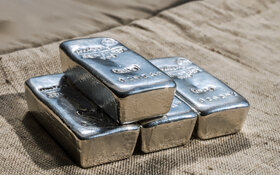Bob Moriarty: Actually, it really scared the hell out of me. What it means is that I can no longer go to college football games.
TGR: Why is that?
BM: You know the president was awarded the Nobel Peace Prize.
TGR: Yes.
BM: We have three-and-a-half wars going and he was awarded the Nobel Peace Prize and then Time magazine came out and made Ben Bernanke the Man of the Year. Now that's the equivalent of being awarded the Nobel Prize for Economics. Stalin was Man of the Year.
It means that Bernanke had the most influence on the world last year, which is quite interesting because it means I cannot go to a college football game anymore.
TGR: Okay. I'm still missing the link.
BM: If I go to a college football game, at half time they give out awards and they do special things. If I go to a college football game, I'm bound to be awarded the Heisman Trophy.
TGR: I hate when they give those out.
BM: Ben Bernanke has done more to destroy the economy of the world. If there was one organization that is responsible for the financial chaos that exists today, it would have to be the Federal Reserve. Ben Bernanke has destroyed the financial system of the world and they're thinking he saved it by creating all this money. Well, wait a minute. That money has to go somewhere.
If you actually look at the numbers, the most accurate number that I've been given is a $23.7 trillion increase in U.S. liabilities. It's not necessarily the government that spent that. We're just on the hook for that kind of money in one year and that has to have an effect. Dubai has defaulted; Greece is not very far away from defaulting; Ireland is very close to defaulting; the U.K. is very close to defaulting; Japan is very close to defaulting; the United States is very close to defaulting; Spain is very close to defaulting. And the one thing that we know is they're going to. So we can either have a deflationary collapse where everybody says, okay, well, remember those $10 trillion that we owed the rest of the world? We're just not going to pay them. Or we can go into hyperinflation. Those are the only two alternatives and either is pretty bad.
Bernanke has guaranteed a collapse of the financial system. We're in the center of the storm, the eye of the storm right now. The hundred or so people in the world who actually understand what's going on are all going, "oh, shit." And Ben Bernanke's sitting there with a grin on the cover of Time magazine. Well, I can guarantee next year he isn't going to be sitting on the cover of Time magazine with a grin. He'll be sitting on the cover of Time magazine with a noose around his neck.
TGR: Do you think these relatively smart people—granted, you stick them in Washington and weird things happen—realize they're in the eye of the storm, and they're just trying to keep the panic down now and try to maneuver things behind the scenes or do you think they're totally oblivious to what they've created?
BM: There's a lot of total oblivion. These guys have all studied Keynesian economics. Keynesian economics simply doesn't work. Anybody who actually understands economics knows that, but that's what they were taught and because everybody around them was talking Keynesian economics, they think you can somehow buy your way out of failure.
Obama came up with this really wonderful quote early in December saying we're going to spend our way out of the recession. My question is—if we spent our way into this recession, how the hell are you going to spend your way out of this recession? Spending is what got us into trouble in the first place. There was another article released last week saying that the number of Federal employees with salaries in the six figures is higher than it's ever been. This is insane. We have 22% unemployment and we have hundreds of thousands of Federal employees earning over $100,000 a year. The 22% unemployment, those people who have no jobs are starting to get really, really pissed. And when they do, we got problems.
The gap between government employees and employees in general is higher than it's ever been. The unemployment in the United States is higher than it's ever been. So not only is the government employment increasing, unemployment's increasing for everyone else. Who do they expect to pay the taxes? And the answer to that is the 47% of people who pay no taxes at all are listening to Pelosi say, "Hey, I've got a great idea. We'll make the rich people pay for the health care." And then a week later she had another really great idea. "Hey, we'll make the rich people pay for Afghanistan." Unfortunately, nobody listened to her definition of rich people. Did you catch that? Did you hear what she said? "Rich people are those who still have a job."
It's the end of empire. Democracy works until the voters learn to give themselves benefits. We have gone into never-never land. For Barack Obama to be awarded the Nobel Peace Prize after being in office for two weeks goes beyond absurd. The fascination with the sex life of Tiger Woods is all over the news and my question is who cares? Are they kidding? We've gone crazy.
TGR: So how are we going to be protecting ourselves investment wise? I'm going to ask a little bit about gold because you're a big gold bug. Gold ran up to above $1,200 and now had quite a decent pullback. You point out correctly that who wouldn't have expected a pullback when it's up for 13 days straight.
BM: We have not seen the top in gold, but corrections are perfectly normal and they're a good thing. Now why should you own gold? You should own gold for two reasons. One is it's an insurance policy. The things that Bernanke and the Federal Reserve and Tim Geithner have done are going to destroy the world's financial system in the end. I know that sounds really catastrophic, but it's going to be catastrophic. The United States is $100 trillion in debt. No sane person can come to me and say, "Bob, there's a way out of that." They can't, there is no way out of that. We're going to default. I don't care if we default next week or next month or next year or 10 years from now. We're going to default and it's going to be catastrophic.
Gold is an insurance policy. It's like an insurance policy on your car or your home or yourself. It's not something that you want to collect on, but for 5,000 years it has worked to protect people's assets. Secondly, as an investment, the general stock market would absolutely terrify me right now. It's so over bought and the P/E ratio has hit historic highs. It's just screaming to take everybody's money away when people wake up to what's really going on. So gold shares, silver shares, energy shares, food shares are a good, safe place to be. It used to be widows and orphans would buy GM and they would buy General Electric and they would buy Ford and Chrysler. Widows and orphans should actually be buying Canadian juniors right now because they might preserve their wealth. They own FAO and Ford and GM and General Electric; they own companies that are walking zombies just waiting to die and be buried.
TGR: If the stock market does take another correction and even a massive one, could it take down even the Canadian juniors, too?
BM: I don't believe that's true. The Canadian juniors have already crashed. It happened last year and everybody had it absolutely wrong except Bob Hoye. Including me. I believed the Canadian juniors were going to be a safe place. But if you look at the ratio of the XAU over gold, the ratio is lower than it's ever been in history and it's been lower for a year. So Canadian juniors are not going to crash; Canadian juniors already have crashed.
The market is going to do whatever it has to do to surprise the biggest number of people and people are expecting a crash in the juniors if the market crashes. I don't think so. You have to have some place of safety. Last year it was gold and this year I believe it will be gold shares. I think that this year—this is a good time to bring it—I think that 2010 will be an extraordinary year for gold shares.
TGR: Does that mean it would be an extraordinary year for all gold shares and once the mania starts happening, will all gold companies rise in value?
BM: Well, that's what's really funny. The biggest piece of crap companies out there are going to go up fifty fold. I would be very hesitant to recommend that people buy into piece of crap gold companies. But when the wind is high enough, even the turkeys fly.
TGR: Do you think in a market place where most people don't understand mining to begin with, they're going to be able to differentiate the crap gold companies, as you call them, from the valuable ones? Why not just buy a market basket of gold companies?
BM: That's a really good move. There are some great funds out there—USAA Gold is a good fund. Frank Holmes does a good job with the U.S. Global Investors Funds; Eric Sprott does a good job with the Sprott Funds. There are some great gold funds out there and that removes the risk of having to make decisions. The reason I spend eight months a year traveling all over the world is I'm trying to give my readers the house advantage and we think we do. I've been doing this for eight years and we pick some pretty good stocks. That doesn't mean they don't go down. Some go up and some go down, but that just proves I'm honest.
TGR: If we look at 2010 and it's going to be this extraordinary year as you're predicting, will the markets be smart enough to recognize and reward better run companies?
BM: Strangely enough, the ones that'll go up the most are the crap companies run by absolute crooks that are selling for a penny and a half right now. You've got to remember going from a penny and a half to three cents is 100% climb. Let me give you an example. I wrote about the International Tower Hill Mines Ltd. (NYSE/AMEX: THM; TSX-V:ITH) a year ago and International Tower Hill, I think, was US$1.04 and it's like $7.32 now. There are hundreds of companies that have gone up more than that and Tower Hill has one of the best deposits in the United States and its run by one of the best guys in the industry. A stock going from $1.04 to $7.32 is no different than a stock going from two cents to 12 cents.
TGR: You're traveling around finding the good deals for eight years, which bodes well in that market place where better projects will reward. But in the market place, everyone's going to get rewarded because you happen to be in the right sector. What's your strategy?
BM: I invest in the best people that I can find. I try to find the best companies and the best people because, while you're waiting for the piece of crap company go from a penny and a half to 15 cents, it may go to a quarter of a cent. You don't know. I buy companies that I like their story, I like their management, I like their location, etc.
TGR: What do you see for silver?
BM: Silver is a commodity right now. When the financial system collapses—and it's going to collapse—and we go back to the gold standard, the metal that you need the most of is silver because of its value as money. In a gold system the money you need most will be silver. At that point it would go back to a historic ratio, somewhere between 15:1 and 25:1. Silver is an investment. It's very dangerous because there are always cheerleaders. The cheerleaders are the guys waving the flags and the pom-poms and showing their butt to everybody saying silver is going to go to $100 an ounce if we get into a war because this is the most critical war metal. Well, we're in three wars and silver has not gone to $100. The cheerleaders say we're going to run out of silver. We're not going to run out of silver. It's a commodity. At some price, it extracts itself from the ground. At $16 to $18 an ounce, there's plenty of silver and silver's supply and demand is in equilibrium. But to move it up relative to everything else, you have to have increased demand and the increased demand is only going to come from using it for coins.
TGR: So the increases we're seeing in gold now through 2010 probably will not reflect on silver?
BM: Actually, the ratio of silver to gold will go up as the economic situation gets worse because people recognize gold as being a safe haven and they don't recognize silver being a safe haven to the same degree. We could go back to a ratio of 90:1 or 100:1, but the idea that silver is somehow a better investment than gold, these guys have been wrong for 10 years. I can't understand why they keep arguing the same thing when all the facts show they're wrong.
TGR: So someone who's looking to the insurance policy or hedging or putting money on the sure bet that the economy and the financials are going to falter should really focus in on gold, not silver.
BM: Focus on gold, but you want to hedge your bets, too. One of the possibilities that always exists is that maybe I'm wrong.
TGR: How would you hedge your bets?
BM: I own physical gold and physical silver and I own silver mining companies and I own gold mining companies.
TGR: You mentioned that you like to invest in the best people and so I'll assume you have certain companies that you feel have management that represents the best of the best. Can you share those with us?
BM: Sure. If you look at the website, we write about them all the time. Animas Resources (TSX.V:ANI) came out with drill results as we're speaking and the drill results didn't appear to be good. The stock got hammered. Somebody sent me the drill results and I looked at it and said, hey, somebody's making a mistake because those are pretty good drill results. They're in the district and they've got really substantial management. In general, I tend to like Mexico. I like Timmins Gold Corp. (TSX.V:TMM), I like Animas, I like Pediment Gold Corp. (TSX:PEZ) (OTCBB:PEZGF) (FSE:P5E). There are so many great stories there.
Endeavour Silver Corp. (TSX:EDR) (NYSE.A:EXK) has got some good deposits down there. Great Panther Resources (TSX:GPR) has got some good deposits. Candente Resource Corp. (DNT:TSX and BVL) has formed a new company called Candente Gold Corp. (CDG.TO). With Mexico you could pretty much throw a dart; I don't think you could lose there. There are some great companies and there's some great management down there.
TGR: Outside of Mexico are there any plays that you're looking at that are interesting?
BM: I wrote about one called EurOmax Resources Limited (TSX-V:EOX) in Eastern Europe, Serbia and Bulgaria and Macedonia. They've got a surplus of good projects and the stock's real cheap now. There are hundreds of companies. I'm not an expert. I go to a gold show and I see half the companies there are companies I've never even heard of before, but there are some real good guys in the industry who cover these and some good subscription services. Greg McCoach has got a good service and Brent Cook has a good service. Lawrence Roulston has a good service. There are some guys who can give good tips.
TGR: Are there any small caps outside of Mexico that you have a few thoughts on?
BM: Oh, dozens and dozens and dozens of them. For example, I happened to be on a trip with some of the people who were investors in Richfield Ventures Corp. (TSX-V: RVC) before they announced their recent results. Richfield is up in B.C. and there's another company right next to them called Silver Quest Resources Ltd. (TSX-V:SQI) and, they had absolutely extraordinary results. You've got to give them credit for that.
I'm always hesitant to list companies that I like because there are hundreds of companies out there who have done extraordinarily well. We got cheaper in relative terms last September, October and November of 2008 than gold stocks had ever been in history. You could have thrown money at companies and made money.
My very favorite company right now is an energy stock. It's not one that anyone can buy. It's still private but it's going to be a very big deal. It will be the Google of investing. It's a company called Titan Oil Recovery Inc. It's run by one of the smartest and best managers I know, Ken Gerbino. Basically the company treats past their prime oil fields with a patented bacterial process that essentially lowers the surface tension of the oil, making it easier for it to flow. Their tests on dozens of oil fields show increased oil production by over 100%. That's giant. In the oil business, most oil gets left in the ground. You can never recover all of the oil in a field. This process is going to be worth many billions of dollars. It's not a total solution to peak oil but it's sure better than anything else I've ever seen or heard of.
TGR: Well, you could have picked almost any of the resource stocks back then.
BM: Yeah, yeah—exactly. You could pick the worst company in the business a year ago and made money. There were companies that were two cents then that are 60 cents now. But in relative terms, here's one thing I would like to point out. We started our website in the summer of 2001 and, like Frank Giustra of Endeavour Financial Corporation (TSX:EDV), we chose to get back into the industry right at the bottom and we said it was the bottom. We were very supportive of companies and we said this is a tremendous opportunity to invest. Of course, nobody believed us because gold was $252 an ounce. Well, people, we're not in Kansas anymore and gold is not $252 an ounce. It's $1,120 and change right now. It was $1,200 and change a month ago. The risk is out of it. Okay. There are some extraordinary stories out there and they're extraordinarily cheap. You should invest, one, because it's a safe place to invest—it's the only safe place to invest that I know of—and, two, because it's so cheap that you should have extraordinary returns.
TGR: Thank you very much for your time, Bob.
Wanting to give others a foundation for investing in resource stocks, Bob and Barb Moriarty brought 321gold.com to the Internet almost nine years ago, and later added a second resource site, 321energy.com, which covers oil, natural gas, gasoline, coal, solar, wind and nuclear energy. Both sites feature articles, editorial opinions, pricing figures and updates on the current events affecting both sectors. Before his Internet career, Bob was a Marine F-4B pilot with more than 820 missions in Vietnam. A Captain at age 22, he was one of the most highly decorated pilots in the war.
Want to read more exclusive Gold Report interviews like this? Sign up for our free e-newsletter, and you'll learn when new articles have been published. To see a list of recent interviews with industry analysts and commentators, visit our Expert Insights page.
DISCLOSURE:
1) Karen Roche, of The Gold Report, conducted this interview. She personally and/or her family own none of the companies mentioned in this interview.
2) The following companies mentioned in the interview are sponsors of The Gold Report: Animas Resources, Timmins Gold Corp., Pediment Gold, Great Panther Resources, EurOmax Resources and Richfield Ventures Corp.
3) Bob Moriarty: I personally and/or my family own the following companies mentioned in this interview: Canaco, Titan Oil Recovery and EurOmax. At 321gold.com, we receive money for advertising from the following companies: Animas, Pediment, Timmins, Endeavour Silver, Great Panther, Richfield Ventures and EurOmax.










































